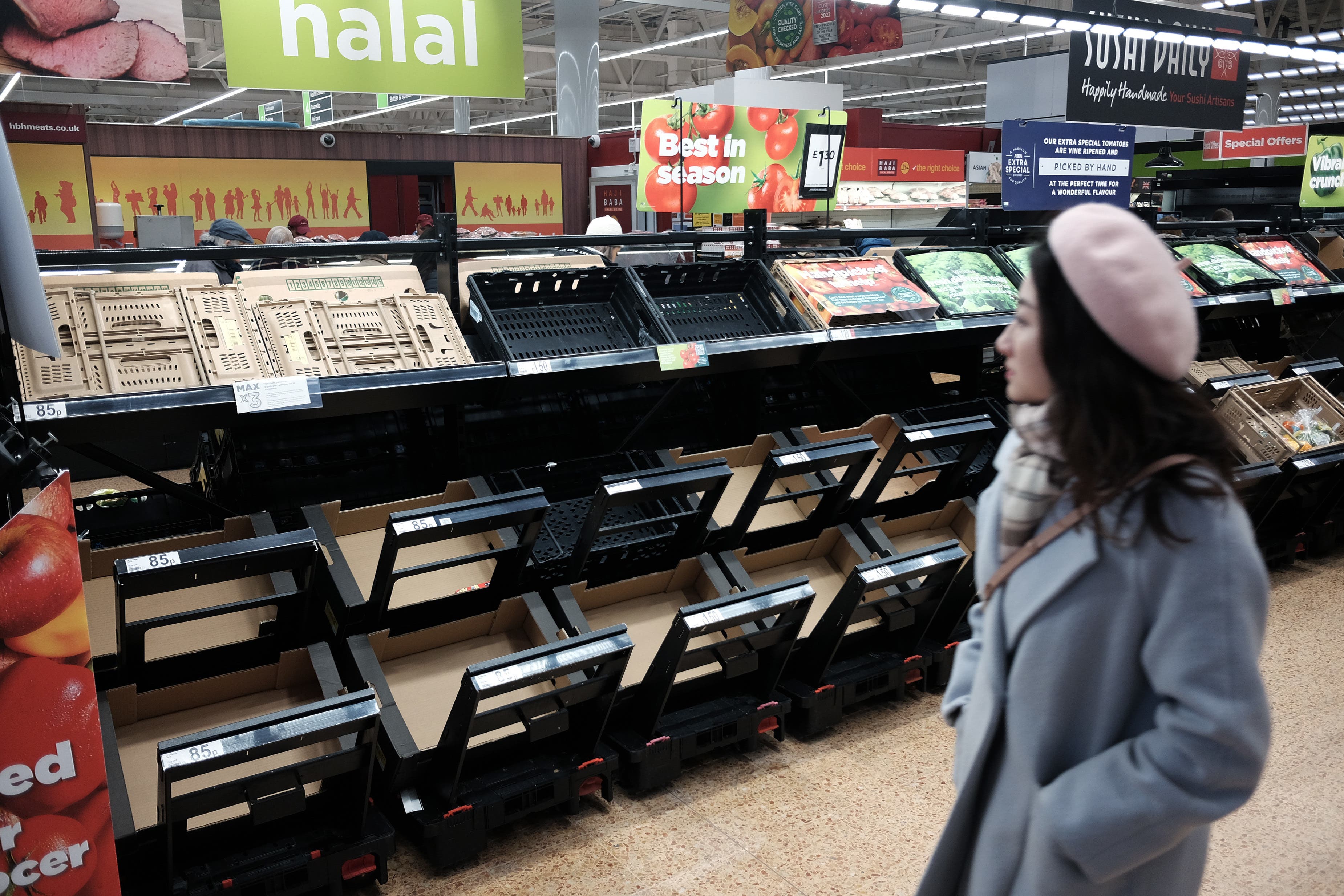The government is doing little except look busy over food shortages
Food minister Mark Spencer has summmoned supermarket bosses to explain themselves. He should be thanking them, writes James Moore, for coping remarkably well


Are the “booze cruises” of yore going to be replaced by tomato runs?
Twitter has been filling up with pictures from across the channel of supermarket shelves bursting with ripe, juicy-looking fruit and veg. They don’t appear to have any need of Therese Coffey’s turnips in France.
Is the next step going to be people hopping on the Eurostar to fill the boot up with fruit and veg for happy salad-making? Will we have entrepreneurs queueing up to hire white vans to sell peppers and cucumbers out of the back of? Apparently there has been talk of relaxing quotas. So it’s not impossible to foresee.
Otherwise, the current government is doing what it always does when there is a crisis: complaining about unfortunate circumstances, and blaming others for failing to anticipate or react to them – all while trying to look terribly busy, and hoping that the problem goes away.
So it’s the weather in Spain – or British shoppers failing to eat seasonally, which led to Coffey’s asinine suggestion that people chow down on turnips, creating quite the panic among the producers of the humble cruciferous vegetable. Or it’s the supermarkets not trying hard enough.
That was what George Eustice – a predecessor of Coffey’s in the big chair at the Department for Enviroment, Food and Rural Affairs (Defra) – implied when he told the BBC that “supermarkets have to work hard to get it right”. He also chimed in with “There isn’t much different the government could have done in recent months.”
Trouble is, the latter had already been comprehensively debunked by the worthy Clive Black, an analyst with Shore Capital. His report, Time for Change at Defra, deserves a wider audience.
“Whilst the rain in Spain fell on the plains, the British government, and most particularly Defra, did what, against a well-known wider domestic context? Well, one senses, pretty much nothing,” he wrote.
“Indeed, leading growers in the UK, a largely unsupported element of British farming, have been clear to the world and its wife that in the face of elevated energy costs, not to mention difficult labour availability, winter 2022/3 capacity would be cut as its profitability would be significantly diminished.”
Now, we can debate whether it’s really a good idea to be pumping energy into growing things in greenhouses. But the point is, an extra source of supply was there if the government wanted it. Some energy-intensive industries have been receiving help with the extra costs they are facing. This industry is not among them.
Black went on to detail failings in respect of egg and pork producers. No wonder Coffey got booed when she rocked up at the National Farmers’ Union conference in Birmingham last week. Hey, Tories: if you’re getting booed at the NFU, you’re in deep, deep trouble.
Black added: “The UK is out of the EU and has autonomy over its agri-food policies. Defra’s timeliness in this respect has been, quite simply, appalling ... Each of the examples outlined above are self-inflicted wounds that have absolutely nothing to do with the EC or the EU. Abject policy failure and inept policy implementation have meant that the UK food system is hindered by the British government.”
Brexit has certainly played a role in weakening Britain’s supply chains; you can start with Boris Johnson’s dismal deal. But “abject policy failure” on the part of the British government might be the biggest offender of all.
So we turn to “blame somebody else”. And here, Eustice would surely be getting a nomination along with Coffey, were they to award a Bafta for “knuckle-headed comment”.
The grocers spend their lives trying to “get this right”. Empty shelves are the last thing they want to see. They have actually coped remarkably well up until now, despite having had the Tories’ ultra-hard Brexit bomb drop on them from a great height.
They’ve improvised and they’ve innovated. Those Tesco trains importing European produce – fresh and otherwise – are still running. The reality is that ministers owe them a vote of thanks. What they are doing instead is passing the buck.
Hence food minister Mark Spencer hauling supermarket bosses in. They could have been forgiven for responding to his “invitation” with a resounding “What the hell?” or perhaps an even saltier four-letter word.
Spencer is trying to look busy. He’s running around like a fly with a blue-covered backside, because “blame someone else” doesn’t appear to be working so well with the public.
Expect nothing out of the meeting. As I’ve said, the supermarkets are already doing everything they can to get produce on their shelves, and the government is out of ideas. Luckily for Spencer, the tomatoes and the peppers and the cucumbers will be back in two to three weeks. But this will happen again.
We live in an uncertain world. There’s the climate crisis, Russia starting wars, and the hardy perennial of what I can only describe as Defra’s stellar incompetence. Weakening your supply chains with Brexit, on top of all that, will carry a price. Today, the consumer is paying it in threadbare salads. Tomorrow it will be something else.






Join our commenting forum
Join thought-provoking conversations, follow other Independent readers and see their replies
Comments